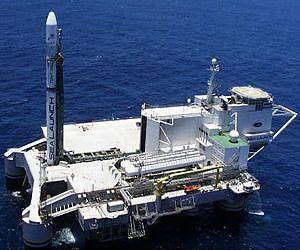The interdepartmental state commission investigating the recent Proton-M carrier rocket launch failure has so far found no evidence supporting the theory that it was caused by deliberate misconduct, Russia's space agency Roscosmos said Thursday.
"The human factor version, including the possibility of a deliberate violation of production norms, is considered during an investigation into every accident or incident, it's a standard procedure. The commission has no information to prove it," Roscosmos said in a statement.
The commission still views technical failures in the third stage control engine as the most likely cause of the May 16 crash, in which Russia's most technologically advanced satellite was lost, the statement said.
On Thursday, the head of the government commission investigating the Proton crash, Alexander Danilyuk, said he believed a third stage engine glitch was at fault, while not ruling out that the failure occurred because of sabotage.
Last week, Danilyuk said four causes of the Proton-M accident were being considered. The commission quickly excluded a failure in the rocket's control systems.
Russian Deputy Prime Minister Dmitry Rogozin on Thursday criticized investigators for creating troubled waters too soon with half-baked theories.
The Proton-M rocket suffered an unknown failure and was lost May 16, about nine minutes after being launched from the Baikonur space center in Kazakhstan. The upper stage and its payload, the advanced Express-AM4R communications satellite, burned up in the atmosphere above China, with no debris reaching Earth.
The Express-AM4R satellite was manufactured by Astrium, an aerospace subsidiary of the European Aeronautic Defense and Space Company (EADS), and was built as part of Russia's space program for 2006-2015.
The crashed rocket was insured for 7.8 billion rubles ($224 million). A replacement for the spacecraft will be built in three years time, the Ministry of Communications and Mass Media said.
"The human factor version, including the possibility of a deliberate violation of production norms, is considered during an investigation into every accident or incident, it's a standard procedure. The commission has no information to prove it," Roscosmos said in a statement.
The commission still views technical failures in the third stage control engine as the most likely cause of the May 16 crash, in which Russia's most technologically advanced satellite was lost, the statement said.
On Thursday, the head of the government commission investigating the Proton crash, Alexander Danilyuk, said he believed a third stage engine glitch was at fault, while not ruling out that the failure occurred because of sabotage.
Last week, Danilyuk said four causes of the Proton-M accident were being considered. The commission quickly excluded a failure in the rocket's control systems.
Russian Deputy Prime Minister Dmitry Rogozin on Thursday criticized investigators for creating troubled waters too soon with half-baked theories.
The Proton-M rocket suffered an unknown failure and was lost May 16, about nine minutes after being launched from the Baikonur space center in Kazakhstan. The upper stage and its payload, the advanced Express-AM4R communications satellite, burned up in the atmosphere above China, with no debris reaching Earth.
The Express-AM4R satellite was manufactured by Astrium, an aerospace subsidiary of the European Aeronautic Defense and Space Company (EADS), and was built as part of Russia's space program for 2006-2015.
The crashed rocket was insured for 7.8 billion rubles ($224 million). A replacement for the spacecraft will be built in three years time, the Ministry of Communications and Mass Media said.









